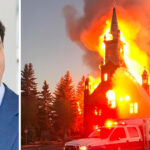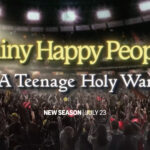Blog Post
Will home-schoolers and Christian classical academies save Western civilization?
By Jonathon Van Maren
Christians—especially evangelical Christians—have often been roundly mocked for pulling their kids out of the public school system and sending them to private schools, or homeschooling them. Aggressive secularists and snotty progressives like to pretend that home-schooled kids are dumb, backwards hicks (as a direct result of being taught by their dumb, backwards parents.) The reality, interestingly enough, is that just as progressives offload the literary canon of Western civilization and begin the process of severing themselves completely from their roots, heritage, and traditions, Christians—through homeschooling associations and classical academies—are rediscovering these riches and working to pass them on.
In Catholic circles, this includes the increasingly popular Chesterton Academies (I spoke with their founder, Dale Ahlquist, on my podcast last fall.) Anthony Esolen has referred to the Western canon as the great unused artillery of the culture wars, and literary professor Dr. Karen Prior explained in a recent interview how the classics can teach us essential virtues—and can even be used in the abortion debate (her most recent book On Reading Well: Finding the Good Life through Great Books is must-read.) According to Louis Markos, a professor of English at Houston Baptist University, in a recent essay in Christianity Today, Christian parents increasingly seem to be in agreement:
In the wake of the fundamentalist reaction against modernism and especially Darwinism, conservative evangelicals tended to withdraw from society. If they did engage society directly (e.g., the temperance movement), it was likely to be critical—asserting what they were against, rather than what they were for. As the universities, the media, and politics absorbed more and more of the modernist worldview, evangelicals withdrew even further, circling the wagons as a means of protecting their children from a society cut off from its Christian roots. Rather than seeking to be salt and light, they embraced a more Old Testament ethos and sought to separate themselves from the unbelievers around them (Ezra 10:11).
This ethos manifested itself in a Bible-only approach to learning that cast suspicion on non-biblical sources of wisdom. What could Christians learn from writers who denied the Christian revelation? As for the pre-Christian classical writers, though they might be excused for their ignorance of the Bible, their acceptance of such practices as idolatry, infanticide, and homosexuality rendered them off-limits.
This was the predominant attitude of evangelical Christians in the 1950s and 1960s. Conversely, today Mars Hill Forum is one of a growing number of evangelical homeschooling co-ops that want to raise up a generation of Christians who know the Bible and who live virtuous lives, and who are also firmly grounded in the pagan classics of ancient Greece and Rome, as well as the Roman Catholic classics of the Middle Ages. I’ve spoken to a number of such groups across the country and have found in each the same contagious atmosphere of learning and desire to be salt and light in the wider culture.
I have found this to be true in many of my own circles. Especially in the last five years or so, I’ve heard the phrase “classical education” pop up constantly in conversation, and I’ve been invited to speak at some of these schools. Many parents want to see their children rooted in the poetry, art, music, and literature that made Western Civilization great in the first place, and there is an increasing realization that these things sprang from an explicitly Christian culture and are part of our collective heritage. As the progressive iconoclasts agitate to get “white men” tossed out of literary survey courses and chant things like “Hey hey, ho ho, western culture’s got to go,” Christian communities are taking the opposite approach and refamiliarizing themselves with these cultural treasures. It must be noted, too, that although Dr. Francis Schaeffer is now primarily known for his role in bringing evangelicals into the pro-life movement, he did a lot of heavy lifting in the role of getting American Christians to reengage with the classics, as well.
Markos notes that many Reformed communities, such as that of Douglas Wilson of Moscow, Idaho (the author of more than 90 books and most famous for his public debates with the late Christopher Hitchens) have led the way in regard to classical education:
A related shift happened among conservative Reformed Christians, many of whom were held back from the classics by an excessively dark view of unsaved human nature, believing it was nearly impossible for Christians to learn things of lasting value from pre-Christian writers like Homer, Plato, and Cicero.
But as Mark Noll noted in The Scandal of the Evangelical Mind, Reformed scholars and presses ironically became major movers and shakers in calling evangelicals to pursue a broader life of the mind. It has been the Presbyterians and other Calvinists who have lit the way in classical Christian education. (A large number of classical schools bear names like Geneva, Providence, Covenant, and Grace.)
In particular, a more careful reading of Calvin and the Bible made the difference. The opening chapters of both Calvin’s Institutes and the Book of Romans (1:18–19, 2:14–15) make a foundational distinction between general revelation—the way God speaks to all people through creation, conscience, and reason—and special revelation, which is found only in the Bible, the prophets, and Christ. This distinction is vital to classical education, for it allows even unbelievers who lived before Christ to arrive at truths that are compatible with Scripture.
Because they lacked access to the special revelation of the Bible, neither Homer nor Virgil, Plato nor Sophocles saw as clearly as Augustine or Aquinas, Dante or Milton. On account of the general revelation vouchsafed them by God, however, they did see something, and that something is worth studying and wrestling with. The virtues championed in Aristotle and Cicero may lack salvific power, but they do have the power to guide students on a path of living that is pleasing to our Creator and that will help restore the soul of our nation.
Take a moment to read the whole article—it is an interesting glimpse into an emerging movement. I suspect most of my readers will not find much of this surprising, especially with the explosion of interest in the classics among homeschoolers and the fairly recent proliferation of classical academies, but it is an fascinating example of what Rod Dreher’s “Benedict Option” might look like as we head towards what Jane Jacobs called the “Dark Age Ahead.” The good news is that Christians have weathered a Dark Age before, which is incidentally where the titles of both Dreher’s and Jacobs’ books come from. Sir Roger Scruton, who passed away this week, believed that Christian communities are essential reservoirs of cultural heritage, too. And what Christians have done before, Markos notes, Christians might do again:
In his 1995 bestseller, How the Irish Saved Civilization, Thomas Cahill argued that many of the pagan (pre-Christian, Greco-Roman) classics were preserved through the Dark Ages by a most unlikely group of people: Irish Catholic monks living in a remote corner of the civilized world. If the country is preparing to enter a type of second Dark Ages devoid of classical thought, another unlikely group of people is arising to preserve the Great Books of the Western intellectual tradition: conservative evangelical Christians.
I believe that inevitably, Christians will be forced to take complete responsibility for the education of their children—while there are some places where Christian schools still receive government funding, it is extraordinarily unlikely that this will last (and it is staggering to me that we are not preparing for this eventuality more thoroughly.) It is encouraging that many are recognizing what is coming, and taking steps to ensure that their children will be bequeathed the heritage and inheritance that the post-modernists are rejecting. In dark times, these cultural jewels glow brightly.









What a great article! Our family has been homeschooling since 1990! I have authored a book that celebrates the life and writing of Dorothy L. Sayers that is especially focused on the Great Books and directed towards homeschoolers. It is available on Amazon. I am attaching the link. https://smile.amazon.com/L-Sayers-Play-Five-Acts/dp/061553872X/ref=tmm_pap_swatch_0?_encoding=UTF8&qid=1579046246&sr=8-3